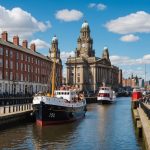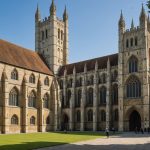Overview of Witchcraft Persecution in the UK
Exploring the witchcraft persecution in the UK unveils a grim chapter in its history. This dark history casts a long shadow, notably during the late 16th and 17th centuries, a period characterized by intense fear and superstition. Witchcraft accusations served as a tool for social and religious control, leading to countless trials and executions.
One of the earliest noteworthy events is the Witchcraft Act of 1542, which made witchcraft a capital offense. The witch hunts reached their peak intensity during 1644-1646, catalyzed by figures like Matthew Hopkins, the self-proclaimed Witchfinder General. His relentless pursuit led to numerous innocent deaths, exemplifying the hysteria of the era. The repeal of the Witchcraft Act in 1736 marked a significant turning point, signifying an end to legally sanctioned witch trials.
Topic to read : Uncover the fascinating georgian heritage: must-visit uk towns for immersive walking tours
The historical context of witchcraft persecution has left an indelible impact, influencing modern perceptions and sparking dark tourism interests. Towns with ties to this dark history have become focal points for those curious about the past, offering a window into the fears and societal tensions of bygone times. Today, this fascination manifests in tourism, where visitors traverse landscapes once shadowed by fear, seeking to understand the historical roots of witchcraft stigmatization.
Notable UK Towns for Dark History Tours
Exploring towns known for witchcraft persecution offers a unique glimpse into the UK’s dark history. These sites blend the historical context with modern intrigue, inviting visitors to unravel the historical background of these enigmatic places.
Also read : Discover Genuine British Gardening: Engage in Hands-On Interactive Workshops for an Authentic Experience
Salem of the UK: Pendle Hill
Pendle Hill, often likened to “Salem of the UK,” is renowned for its infamous witch trials. A key event in this dark history was in 1612, when twelve individuals were accused of witchcraft, leading to ten executions. Today, visitors can experience this historical context by exploring sites like Lancaster Castle, where the trials took place. Guided tours provide insight into the eerie tales surrounding these events, offering a tangible connection to the past.
The Mystique of Cornwall
In Cornwall, the rich traditions of folklore and witchcraft come alive. Known for figures like Joan Wytte, dubbed the “Fighting Fairy Woman,” this region is steeped in historical background relating to witch trials. The Museum of Witchcraft and Magic in Boscastle is a core attraction, blending history with the allure of dark tourism. Visitors can immerse themselves in the mystical atmosphere through local tours that uncover Cornwall’s enigmatic past.
The Haunted Streets of Edinburgh
Edinburgh, with its dark history, offers compelling sites linked to witchcraft. From the chilling tales of the Old Town to Mary King’s Close, these iconic locations draw tourists eager to explore the intersections of legend and reality. Walking tours delve into the haunted narratives, making Edinburgh a captivating destination for those interested in the historical context of witchcraft.
Historical Sites and Attractions
Visiting witchcraft landmarks in the UK offers a captivating dive into history. These historical sites immerse visitors in the dark tourism attractions that echo tales of past fears and accusations, enriching the understanding of witchcraft persecution.
One prominent location is Pendle Hill. Known for its infamous trials, it serves as a critical site for those curious about the historical context of witchcraft. Exploring Lancaster Castle, where the trials were conducted, connects visitors to these significant events. The Museum of Witchcraft and Magic in Boscastle further enchants those interested in Cornwall’s mystical past, showcasing a comprehensive collection of witchcraft artefacts.
Each of these historical sites holds unique significance. For instance, Edinburgh’s Mary King’s Close invites explorers into its shadowy alleys, rich with stories of the city’s haunted past. Such sites illuminate the weight of history, offering a stark look at the societal dynamics of bygone eras.
When visiting, consider guided tours or self-directed explorations. Local guides often provide deeper insights into these locations’ witchcraft history, enhancing the educational experience. Engaging with these sites provides a poignant reminder of how perceptions of witchcraft shaped historical narratives.
Recommended Tours and Experiences
Delving into the world of witchcraft tours provides a distinctive journey through the UK’s historical tapestries. These dark history experiences encompass a variety of formats, catering to all curiosity levels and time availability.
Guided and Self-Guided Tours
Guided tours offer structured insights into witchcraft tales, with expert guides regaling visitors with eerie truths and myths. Popular choices include Pendle Hill’s witch trials exploration and Edinburgh’s Old Town haunted walks, ideal for engaging with historical narratives. Conversely, self-guided tours empower travelers to discover at their pace. Maps and audio guides enrich this independent exploration, particularly suitable for detail-oriented visitors.
Family-Friendly Options
For those seeking family-friendly options, many tours and attractions embed educational elements into their offerings. Interactive exhibits at the Museum of Witchcraft in Cornwall cater to learners of all ages, sparking interest in historical context. Engaging activities and thematic storytelling make learning accessible and enjoyable, stimulating young minds.
Unique Dark Tourism Packages
For travellers desiring themed packages, unique dark tourism options abound. Partnerships with local historians and experts enhance these experiences, often bundling historical tours with charming local stays. Visitors might choose to combine a Pendle Hill walking tour with a stay in a quaint Lancashire inn, enriching their visit through embracing both history and hospitality.
Visitor Tips and Practical Information
Embarking on a journey through the UK’s dark history of witchcraft offers an intriguing blend of history and thrill. To ensure a fulfilling experience, consider planning strategically for these dark history tours.
Travel Tips: Research the historical context of each destination to fully appreciate the events that shaped their histories. Many areas offer both guided and self-guided witchcraft tours, which should be booked ahead to secure your spot, especially during peak times.
Best Times to Visit: Spring and autumn are ideal, offering mild weather perfect for exploring on foot. This timing also often coincides with local festivals that enhance the tourism experience with additional historical insights and festivities relevant to witchcraft persecution.
Planning Resources: Look for local tourism websites or travel agencies specializing in dark tourism. They often provide detailed itinerary suggestions and insider tips for a seamless trip. It’s also beneficial to check for witchcraft history talks or events, adding depth to your visit.
Engaging with these tips not only enhances the journey but enriches your understanding of the UK’s dark history, making your exploration both memorable and insightful.










